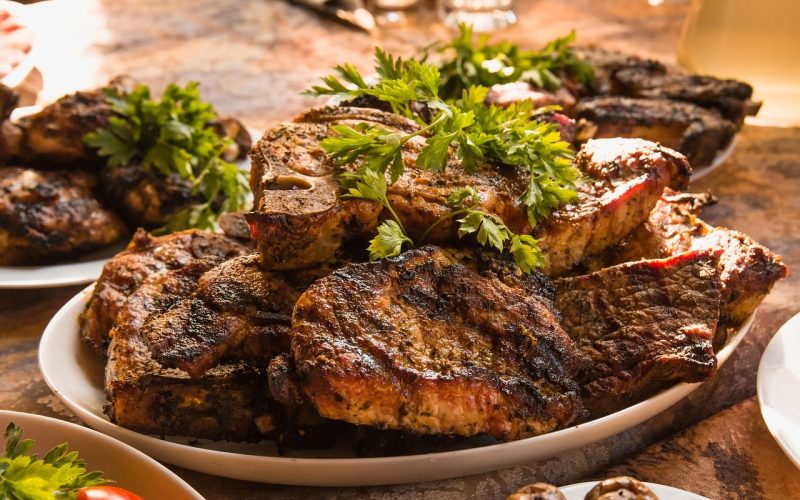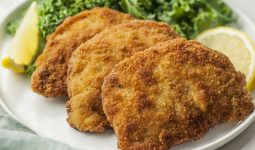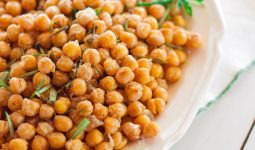To make sense of how many calories in protein, it’s first necessary to understand the basics.
So, let’s start by defining the fundamental terms: calories and protein.
What is a Calorie?
A calorie, in the context of nutrition, is a unit of energy. When you eat or drink, you’re taking in calories.
It’s the fuel your body uses to function, from powering your physical activities to maintaining your body’s basic functions, like breathing and thinking.
While every food and beverage contains calories, the amount varies.
For instance, compare how many calories in an apple to how many calories in a slice of pizza.
The difference is stark, right? That’s because different foods have diverse nutritional compositions.
What is Protein?
Protein, on the other hand, is a macronutrient vital for building and repairing tissues in your body.
It’s a major component of your skin, hair, muscles, and bones. It also plays a crucial role in creating enzymes and hormones.
Protein is found in a variety of food sources, from animal products like meat and dairy to plant-based foods like legumes and grains.
Just like with calories, the amount of protein varies widely depending on the food source.
Now, you might be wondering, how do these two concepts connect? How does the protein you eat translate into calories your body uses? That’s what this article aims to explain as we delve deeper into the relationship between calories and protein.
Stay tuned as we crack the nutritional code and explore how many calories in protein, why protein is vital for your body, and how you can incorporate it into your diet effectively.
The Nutritional Value of Protein
Understanding the nutritional value of protein is crucial when you’re counting calories or trying to maintain a balanced diet.
So, let’s take a close look at how many calories are in protein and why this nutrient is essential for your body.
How Many Calories are in Protein?
A crucial fact to keep in mind when you’re counting calories is that each gram of protein contains approximately 4 calories.
This value is the same regardless of the protein source. However, it’s also important to remember that food items containing protein often also include fats and carbohydrates, which contribute to the total caloric content.
Here’s a simple table to help you visualize the calorie content of some common protein sources:
| Protein Source | Protein (g) | Calories |
|---|---|---|
| Chicken breast (100g) | 31 | 165 |
| Eggs (1 large) | 6 | 78 |
| Lentils (1 cup) | 18 | 230 |
| Tofu (100g) | 8 | 144 |
Remember, the calorie content can vary depending on the cooking method and any additional ingredients used.
Our articles on how many calories in fried chicken and how many calories in scrambled eggs can provide more in-depth information.
Why is Protein Essential for Your Body?
Protein is more than just a source of calories. It’s also a critical nutrient that your body needs to function properly.
Here are a few reasons why protein is so essential:
- Growth and Repair: Your body uses protein to build and repair tissues. This is vital for growth, especially during childhood and adolescence.
- Building Blocks of Cells: Proteins are the building blocks of cells and are required for the structure, function, and regulation of your body’s tissues and organs.
- Energy Source: When other sources of energy (like carbohydrates and fats) are low, your body can use protein for energy.
- Hormone Production: Some hormones, like insulin and growth hormone, are proteins. These hormones are critical for various bodily functions.
- Immune Response: Antibodies, which help your body fight off infections, are proteins.
Incorporating enough protein in your diet is crucial for your overall health.
While it’s important to know how many calories are in protein, it’s equally vital to understand the nutrient’s role in your body’s functioning.
So, whether you’re a calorie counter, a fitness enthusiast, or someone just trying to eat healthier, knowing your proteins can make a big difference!
Protein and Weight Management
When it comes to managing your weight, protein plays a critical role.
Let’s delve into how protein can aid in weight loss and muscle gain.
The Role of Protein in Weight Loss
Protein is an essential part of any weight loss diet. It’s more satiating than both carbohydrates and fats, meaning it can help you feel fuller for longer periods.
This can lead to a decrease in overall calorie consumption throughout the day.
Another benefit is the thermic effect of food (TEF). TEF refers to the amount of energy required to metabolize different nutrients.
Protein has a higher TEF compared to fats and carbohydrates, meaning your body burns more calories to digest, absorb, and process protein.
Moreover, protein can also aid in preserving lean muscle mass during weight loss, which is crucial for maintaining metabolic rate and preventing weight regain.
To learn more about the role of protein in weight loss, check out our article on what is calorie counting.
The Connection Between Protein and Muscle Gain
When it comes to muscle gain, protein is indispensable. It’s the building block of muscles, and consuming enough protein can help repair and build new muscle fibers damaged during exercise.
The process of building muscle involves a balance between muscle protein synthesis (growth) and muscle protein breakdown.
Consuming protein can tip this balance in favor of muscle protein synthesis, leading to muscle growth.
Furthermore, protein can help reduce muscle soreness and speed up recovery after intense workouts, allowing you to train more frequently and effectively.
Remember, to gain muscle, it’s necessary to consume more protein and combine it with strength training exercises.
Don’t forget to balance your protein intake with enough carbohydrates and fats to provide energy for your workouts.
Understanding how many calories in protein and how protein affects your body can help you make informed decisions about your diet and exercise routine.
Whether your goal is to lose weight, gain muscle, or both, protein is a vital nutrient that should not be overlooked.
Check out our articles on how many calories in whey protein and how many calories in scrambled eggs for more information.
Incorporating Protein in Your Diet
Finding the balance between protein intake and overall caloric intake is vital for maintaining a healthy diet and lifestyle.
Here, we delve into choosing high-protein foods and how to balance protein with other nutrients in your diet.
Choosing High-Protein Foods
Protein is a crucial part of your diet. It’s even more important if you’re aiming to manage your weight or build muscle.
So, how do you choose high-protein foods without piling on the calories?
First, you need to understand that not all high-protein foods are created equal. Some are also high in unhealthy fats and calories.
For instance, while a fried chicken breast is packed with protein, it’s also high in calories, especially when compared to grilled chicken.
Here’s a comparison of protein content in various types of chicken:
| Food | Protein (g) | Calories |
|---|---|---|
| Grilled chicken (100 g) | 27 | 165 |
| Fried chicken (100 g) | 25 | 239 |
Other great protein sources include eggs, lean meats, fish, and legumes.
It’s advisable to vary your protein sources to ensure you’re also getting a good mix of other essential nutrients.
Balancing Protein and Other Nutrients
While protein is important, it’s just one part of your dietary needs. Balancing your intake of protein with other nutrients is key to a healthy and sustainable diet.
Carbohydrates and fats, often demonized in diet culture, are actually essential to your body’s functioning. Carbohydrates provide energy, while fats support cell growth and nutrient absorption.
If you’re looking to lose weight, it can be tempting to cut your calorie intake drastically.
However, this can lead to nutrient deficiencies and health problems in the long run.
Instead, try to focus on consuming nutrient-dense foods that are low in calories but high in protein, vitamins, and minerals.
Here’s a comparison of protein and calorie content in various food items:
| Food | Protein (g) | Calories |
|---|---|---|
| Eggs (2 medium) | 12 | 143 |
| Grilled chicken (100 g) | 27 | 165 |
| White rice (100 g) | 2.7 | 130 |
| Cheese (1 slice) | 6.7 | 113 |
In conclusion, it’s all about balance. Ensure you’re getting enough protein, but also consider your overall calorie and nutrient intake.
The key is to make informed food choices and find what works best for your body and lifestyle.
For more about counting calories, check out our article on what is calorie counting.
FAQs About Protein and Calories
Can Eating More Protein Help Me Lose Weight?
Yes, it can! Consuming a diet high in protein can aid in weight loss. Protein tends to keep you feeling full longer, which can help curb overeating. Additionally, the process of digesting protein burns more calories compared to fats or carbohydrates. So, you’re burning calories even as you eat! However, it’s important to balance your protein intake with other essential nutrients. Feel free to read more about it in our article on what is calorie counting.
Are All Protein Sources Equal in Caloric Value?
No, not all protein sources are created equal in terms of calorie content. The caloric value of a protein source depends on factors like how it’s prepared and what other nutrients it contains. For example, a grilled chicken breast is a lean source of protein and contains fewer calories than a fried chicken breast, which has additional calories from fat. For more specifics, check out our articles on how many calories in grilled chicken and how many calories in fried chicken.
How Can I Calculate the Calories in My Protein Sources?
To calculate the calories in your protein sources, you’ll need to know that each gram of protein contains approximately 4 calories. So, if you know the number of grams of protein in your food, you can calculate the calories from protein by multiplying the grams by 4. However, keep in mind that most foods contain a mix of protein, carbohydrates, and fats, all of which contribute to the total calorie count. For more specific calorie counts for various foods, head over to our collection of articles on calorie content, including how many calories in eggs, how many calories in rice, and how many calories in wine among others.







